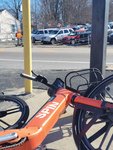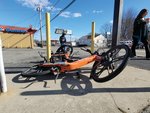

The last rental riders left their pair of electric bikes under a Hartford Avenue business sign days ago.
By Tuesday afternoon, the bikes had fallen over.
Town Council has taken aim at bulky rentals blocking public rights of way. If passed, police will impound app-based electric bikes and scooters left on public streets and sidewalks overnight, and companies could face a $500 fine for each abandoned two-wheel vehicle.
“We’re so close to Providence that they ride over the line, and most people don’t realize it,” said Rob Parrish, food truck manager for Friskie Fries.
The bikes are outside Friskie Fries’ Johnston location at 751 Hartford Ave., next to the street near the eatery’s parking lot entrance.
“Spin needs to collect them more often,” Parrish said. “You can’t move them without the alarm going off.”
And once the riders took them out of Providence and parked the bikes, they were unable to get them started again, to travel back into the city.
“Basically, with Providence being an adjoining community that has agreements with multiple companies that have these shared electric scooters and bicycles, they’re being left in Johnston public rights of way from time to time,” Johnston Assistant Town Solicitor Dylan Conley explained Monday night at Johnston’s Town Council meeting.
Town Council voted unanimously to approve the ordinance, which states “no digital application based shared scooter and/or bike business shall allow any of its shared scooters or bikes to remain on any public property, public right of way, public street, or sidewalk overnight.”
The new law grants Johnston Police the authority to impound abandoned rental bikes and scooters and levy a $500 fine.
“This allows the police to impound the vehicles and impose a fine,” Conley said. “Then we have a built-in exception.”
The law has includes an exemption for businesses that broker an agreement with the town.
“It is somewhat common for these companies to come to agreement with other municipalities and surrounding areas,” Conley said. “I believe they just did something to that affect with the East Bay Bike Path about a year ago. It would be to the town’s advantage to negotiate a different agreement, rather than the police having to impound these vehicles.”
District 5 Town Councilman Robert J. Civetti questioned the license requirements for rental companies.
“Shouldn’t these companies, if the scooters are going to be in the town of Johnston, shouldn’t they have to come for an operating license within the town itself?” Civetti asked.
“That’s exactly what we’re talking about,” Conley replied.
“I didn’t see anywhere where it says they need to … have an operating license,” Civetti said. “It says they need to come to a separate agreement.”
“That’s what we were contemplating,” Conley said.
District 1 Town Councilwoman Linda L. Folcarelli wondered what residents should do if they spot a scooter or a bike loitering on a town public way.
“If we see some of these scooters just lying around for a couple of days, can (we) contact the police department?” Folcarelli asked.
“Yes, if this passes, we can contact the police department and the police department has the authority to impound them,” Conley replied.
Civetti asked Conley what the current law permits.
“Even without this passed, and (police are) seeing stuff on the sidewalks, can’t they impound them?” Civetti asked.
“Most likely,” Conley answered. “The challenge is, ‘What is your clear distinction between one of these bicycles and any other bicycle, any other scooter, any other car parked in an area where it’s not supposed to be parked for an extended period?’”
Conley argued the town should clearly set “application-based shared scooters and bikes” apart, and define town policy. That would enable the town to pursue the owners, rather than individual renters.
“The other challenge with these more generally, is even within their agreement, they’ll most likely impose a liability for leaving it somewhere where it’s not supposed to be left,” Conley explained. “I’m the last person to drive it. The town doesn’t want to be in the position where they have to try to chase down the last person in order to accrue the fine. So we’re shifting that responsibility to the company.”
Spin did not return a request for comment on the Johnston ordinance by press-time.
According to the company website, Spin requires riders to be 18 years of age or older, and upload a valid payment method.
“We’re reimagining the way people and cities flow,” Spin claims on its website.
The company calls itself the world’s top “micromobility player — committed to being the best possible partner for cities while building the safest, most equitable, and most sustainable mobility solution for the communities we serve.”
Based in San Francisco, Spin operates “dockless electric scooters on campuses and in cities across North America and Europe.”
“Spin has been recognized for launching the first stationless mobility program in the United States and was instrumental in crafting the world’s first mobility permit system,” according to the company. “As a technology company that powers individual mobility for the benefit of all and strategically collaborates to reshape policy and redesign urban life, our mission is to create a world full of 15-minute cities — and to bring those cities to life by moving people freely through their streets.”
Despite the clutter, businesses like Friskie Fries appreciate the electric scooter and bike rental companies, because they help carless customers travel to their locations.
“We appreciate our local community,” Parrish said. “We would not be here without our local customers in Johnston and Providence.”
Johnston Police are ready to enforce the new law.
“The Johnston Police Department appreciates that the Johnston Town Council has addressed this issue through a proposed ordinance, 2023-3, amending Chapter 328 of the Johnston Code of Ordinances,” Johnston Police Chief Mark A. Vieira said via email Wednesday. “The proposed ordinance would allow officers to take steps to remove the potential hazard and address violations pertaining to the use of these scooters/electric bicycle sharing devices on public property, public rights-of-way, and public streets or sidewalks.”
The bikes were likely left along Hartford Avenue due to preset conditions built into the sharing app.
“Spin scooters, and other types of electric bicycle-sharing devices, have preset ride zones that set boundaries as to where these devices will work,” Vieira explained. “The Johnston-Providence border runs directly through the property of the Domino’s Pizza restaurant located on Hartford Avenue. As the scooters passed that boundary line, they apparently shut down, became inoperable, and were abandoned by their operators.”
Comments
No comments on this item Please log in to comment by clicking here